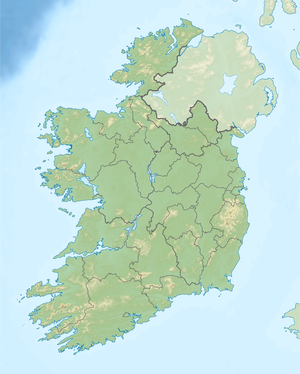Kilmichael Ambush
| Kilmichael Ambush | |||||||
|---|---|---|---|---|---|---|---|
| Part of the Irish War of Independence | |||||||
 Monument at the ambush site |
|||||||
|
|||||||
| Belligerents | |||||||
|
(West Cork Brigade) |
(Auxiliary Division) |
||||||
| Commanders and leaders | |||||||
|
|
|
||||||
| Strength | |||||||
| 36 volunteers | 18 officers | ||||||
| Casualties and losses | |||||||
| 3 dead | 17 dead, 1 wounded | ||||||
|
|
|||||||
The Kilmichael Ambush (Irish: Luíochán Chill Mhichíl) was an ambush near the village of Kilmichael in County Cork on 28 November 1920 carried out by the Irish Republican Army (IRA) during the Irish War of Independence. Thirty-six local IRA volunteers commanded by Tom Barry killed seventeen members of the Royal Irish Constabulary's Auxiliary Division. The Kilmichael ambush was politically as well as militarily significant. It occurred one week after Bloody Sunday, marking a profound escalation in the IRA campaign.
The Auxiliaries were recruited from former commissioned officers in the British Army. The force was raised in July 1920 and were promoted as a highly trained elite force by the British media. In common with most of their colleagues, the Auxiliaries engaged at Kilmichael were World War I veterans.
The Auxiliaries and the previously introduced Black and Tans rapidly became highly unpopular in Ireland due to intimidation of the civilian population and arbitrary reprisals after IRA actions – including burnings of businesses and homes, beatings and killings. A week before the Kilmichael ambush, after IRA assassinations of British intelligence operatives in Dublin on Bloody Sunday, Auxiliaries fired on players and spectators at a gaelic football match in Croke Park Dublin, killing fourteen civilians (thirteen spectators and one player).
The Auxiliaries in Cork were based in the town of Macroom, and in November 1920 they carried out a number of raids on the villages in the surrounding area, including Dunmanway, Coppeen and Castletownkenneigh, to intimidate the local population away from supporting the IRA. They shot dead one civilian James Lehane (Séamus Ó Liatháin) at Ballymakeera on 17 October 1920. In his memoir, Guerilla Days in Ireland, Tom Barry noted that before Kilmichael the IRA hardly fired a shot at the Auxiliaries, which "had a very serious effect on the morale of the whole people as well as on the IRA". Barry's assessment was that the West Cork IRA needed a successful action against the Auxiliaries in order to be effective.
...
Wikipedia

